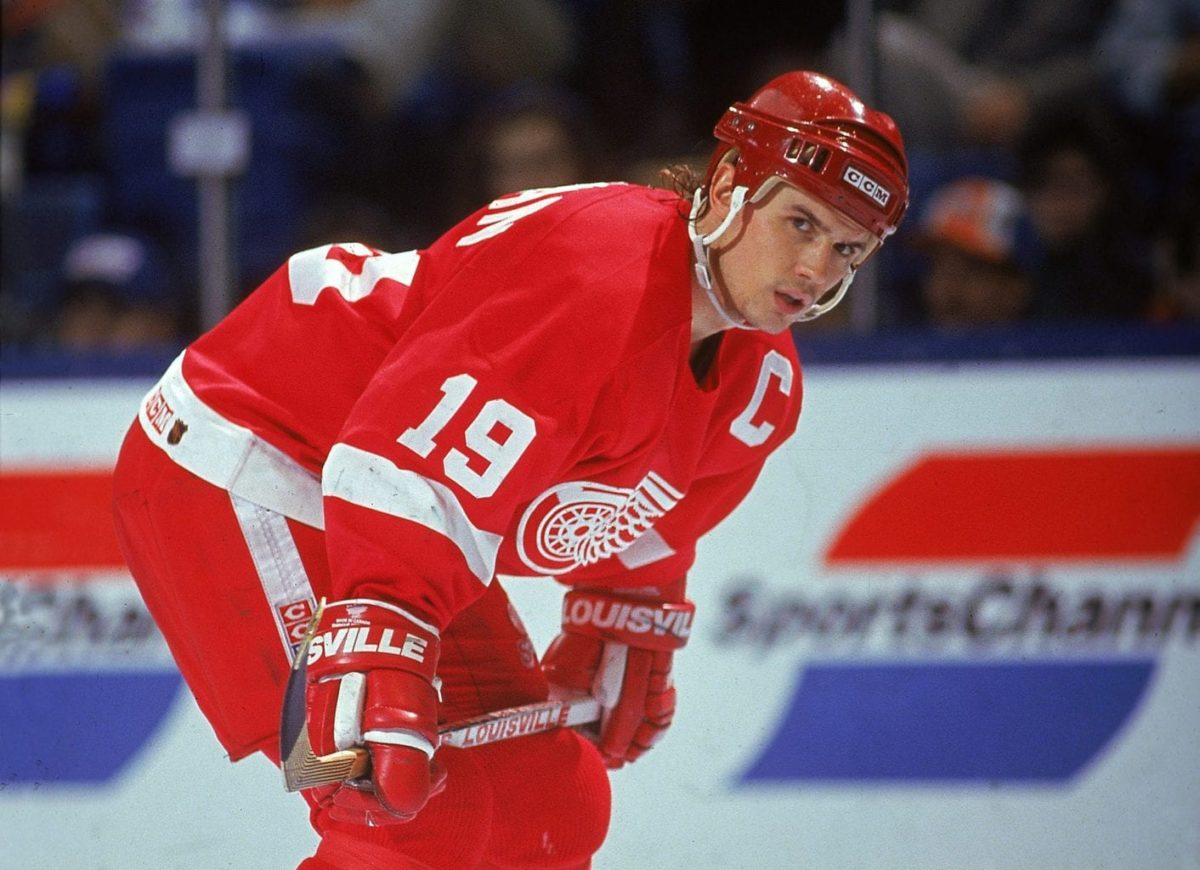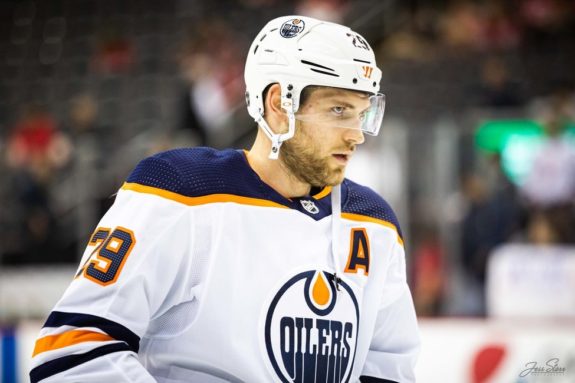Is it corny to say that he’s the engine that drives the team from the Motor City?
Ask any general hockey fan to name a player on the 2020-21 Red Wings, and chances are that the name Dylan Larkin will be the first that comes to mind. He’s the token “good player on a bad team” not unlike Jack Eichel with the Buffalo Sabres. However, what people may not realize is just how good of a player No. 71 really is.
The topic of “the most underrated player in the NHL” has been dominated by the likes of Nicklas Backstrom and Aleksander Barkov for what seems like forever – and for good reason. Backstrom is heavily overshadowed by his generational teammate Alex Ovechkin. Barkov has been doing his thing for a Florida Panthers team that nobody really cared about until their sudden breakthrough this season. Now that the former is in the back half of his career and the latter has drawn more attention due to his team’s success, it’s time to consider Larkin in the same breath as these two.
A Playmaking, Two-Way Forward
It might surprise you to know this, but Larkin is actually in the midst of one his most ineffective seasons since breaking into the league at the start of the 2015-16 campaign. His current points per game (P/G) rate of .56 is tied with his rookie season for the second-worst rate of his career, and his relative Corsi number (plus-3.2%) pale in comparison to his career-best season, the 2018-19 season. Despite all of this, the Red Wings’ captain continues to impress on a nightly basis.
It starts with his ability to create plays like nobody else on his team can.
Larkin regularly extends plays just by holding the puck and meandering around the offensive zone until a shooting or passing lane opens up. His ability to do this helps bring out the best in players like Robby Fabbri and Filip Zadina as they both need a reliable playmaker on their line to help get them the puck in scoring areas. As the play above highlights, Larkin can do that, and make it look pretty too.
It’s not just about his play in the offensive zone, though. When you play as much as Larkin does (he averages around 21 minutes of ice-time over the last three seasons) you’re bound to find yourself in every situation a hockey game can present. Despite seeing minimal time on the penalty kill, he is far from a liability in his own end. His positive impact on possession means that he’s able to move the puck in the right direction when he’s on the ice; while he’s not an active defender like, say, Luke Glendening, he’s able to put himself in good spots to either break up a play or be in position to receive a breakout pass. In fact, the key to really cementing himself as a top pivot in the NHL could be to embrace the defensive side of the game, much like Patrice Bergeron and Jonathan Toews.
Some players rely on their offensive capabilities to outweigh their defensive struggles. Others rely on strong defensive play to make up for their lack of offense. Larkin finds himself right in the middle. He makes the players around him better and more productive in the offensive zone, and he doesn’t punish the Red Wings when he plays in his own zone. All things considered, it’s no wonder head coach Jeff Blashill leans on him so much from game to game.
Detroit’s Captain
The captain’s “C” carries a lot of weight in Hockeytown. There’s a reason that the organization waited a couple years before naming Henrik Zetterberg’s successor. This is a team that returned to greatness on the back of “The Captain”, Steve Yzerman. The next player to wear the “C” after him was one of, if not the greatest defensemen to play the game, Nicklas Lidstrom. That’s not to mention other greats to wear the “C” for Detroit such as Ted Lindsay, Alex Delvecchio and Mr. Hockey himself: Gordie Howe.

The incredible weight of this responsibility is only magnified by the fact that the Red Wings are near the bottom of the standings and have been for almost five years now. Fans and media alike look for answers when things aren’t going right for this team – which happens more often than Larkin would like. That leads to press conferences like this one, where you can’t help but feel bad for the 24-year-old captain.
Larkin set the tone for this season even before he was announced as the captain.
“Let’s make sure to put the work in and make sure what happened doesn’t happen again on our watch,” Larkin said. “It stops now.”
Of course, it’s a lot easier to talk the talk than it is to walk the walk – especially when everyone around the league has wrote off the team before the season even began. But, to his credit, Larkin is the first to point inward when the Red Wings have encountered turbulence this season. On many occasions this season when he’s been asked what went wrong, he is quick to answer “I’ve got to be better.” When your captain holds themselves accountable, that mentality spreads throughout the locker room.
People debate the value of intangibles in the game of hockey, but this is the type of intangible that you can’t properly attach a value to. Just like Toews in Chicago, Larkin’s value to Detroit is as much tied to his ability to rally the troops as it is to his ability to produce on the ice.
League-Wide Comparisons
I’ve got some names for you: Mark Scheifele, Patrick Kane and Leon Draisaitl. That’s two Hart Trophy winners, and the top center for arguably the second-best team in Canada (who has an argument about being underrated himself). Would it surprise you to know that Larkin has posted better possession stats than all three of these players since the start of the 2019-20 season?
To further contextualize this, all three of those players went with their teams to the Edmonton playoff bubble last year, and all three of them are again in the thick of the playoff race in their respective divisions. The Red Wings were the worst team in the league last season, and they’re still in the bottom-three this season. It’s (relatively) easy to do well on a good team; it is typically very hard to do well on a bad team. It’s even harder to get recognized for your efforts when onlookers look at the team’s record and assume that the team has nothing good going on.

That, more so than any other reason, is why Larkin is so underrated in this league: nobody cares about a Red Wings team that has won just 29 out of 107 games over the last two seasons. Fair or not, players are often judged mostly by their team’s success – it’s why the Hart Trophy is almost never awarded to a player whose team missed the playoffs. Even Connor McDavid has some nay-sayers because his Oilers have yet to make it past the second round of the playoffs during his time in Edmonton.
Maybe that’s the core argument of this article: stop judging players based solely on their team’s performance. Doing so leaves you blinded to the efforts put forth by players – such as Larkin – who are doing a lot of the same things as other household names on better teams.
Detroit’s Core Piece
The unfortunate nature of a rebuild is that you never know how long it will take. What helps the process is knowing that a foundational piece is in place that the team can build around. Sure, the kids are coming, but they’re going to need quality players to play with, otherwise the team will quickly end up in purgatory like the Arizona Coyotes and the Sabres. The Red Wings have that foundational piece in place and a heck of a good player to build around in Larkin.
It may not be until the Red Wings start climbing up the standings, but the hockey world will one day realize just how good of a player the Red Wings found with the 15th pick of the 2014 draft. Maybe it’ll be because he returns to scoring 70 points a season. Maybe it’ll be because he shuts down the other teams’ best players. Or maybe it’ll be when he becomes the next Red Wings captain that commissioner Gary Bettman hands the Stanley Cup to.
No matter when or how it happens, that day is coming. To the rest of the league: you’ve been put on notice.
Want more Red Wings content? Tune into The Hockey Writers’ Grind Line — a weekly show on YouTube and Facebook. Check out our most recent show below, and make sure you subscribe to the channel so you don’t miss any upcoming shows.